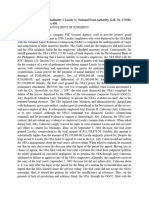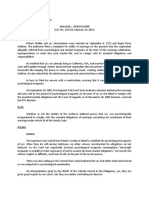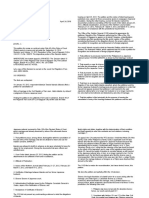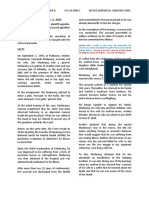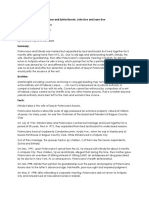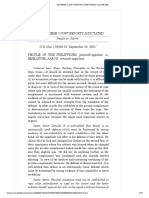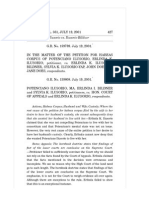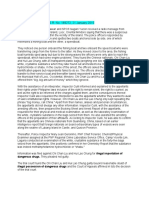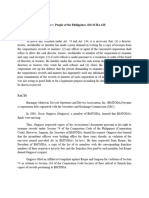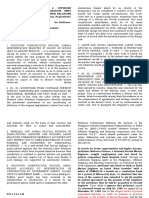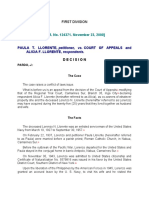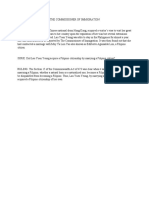0 ratings0% found this document useful (0 votes)
186 viewsChua v. People Case Digest
Chua v. People Case Digest
Uploaded by
Ansai CaluganThe petitioner took out a loan and issued checks that were dishonored. The petitioner was charged with violation of BP22 in the MeTC and found guilty. The petitioner filed a petition for certiorari to the RTC challenging the MeTC decision, which was denied. The petitioner filed a motion for reconsideration which was also denied. The Supreme Court ruled that the petitioner failed to comply with the requirement of filing a motion for reconsideration with the RTC before seeking other remedies, as a motion for reconsideration is generally required before filing a petition for certiorari under Rule 65.
Copyright:
© All Rights Reserved
Available Formats
Download as DOCX, PDF, TXT or read online from Scribd
Chua v. People Case Digest
Chua v. People Case Digest
Uploaded by
Ansai Calugan0 ratings0% found this document useful (0 votes)
186 views1 pageThe petitioner took out a loan and issued checks that were dishonored. The petitioner was charged with violation of BP22 in the MeTC and found guilty. The petitioner filed a petition for certiorari to the RTC challenging the MeTC decision, which was denied. The petitioner filed a motion for reconsideration which was also denied. The Supreme Court ruled that the petitioner failed to comply with the requirement of filing a motion for reconsideration with the RTC before seeking other remedies, as a motion for reconsideration is generally required before filing a petition for certiorari under Rule 65.
Original Description:
Civil Procedure Case Digest
Copyright
© © All Rights Reserved
Available Formats
DOCX, PDF, TXT or read online from Scribd
Share this document
Did you find this document useful?
Is this content inappropriate?
The petitioner took out a loan and issued checks that were dishonored. The petitioner was charged with violation of BP22 in the MeTC and found guilty. The petitioner filed a petition for certiorari to the RTC challenging the MeTC decision, which was denied. The petitioner filed a motion for reconsideration which was also denied. The Supreme Court ruled that the petitioner failed to comply with the requirement of filing a motion for reconsideration with the RTC before seeking other remedies, as a motion for reconsideration is generally required before filing a petition for certiorari under Rule 65.
Copyright:
© All Rights Reserved
Available Formats
Download as DOCX, PDF, TXT or read online from Scribd
Download as docx, pdf, or txt
0 ratings0% found this document useful (0 votes)
186 views1 pageChua v. People Case Digest
Chua v. People Case Digest
Uploaded by
Ansai CaluganThe petitioner took out a loan and issued checks that were dishonored. The petitioner was charged with violation of BP22 in the MeTC and found guilty. The petitioner filed a petition for certiorari to the RTC challenging the MeTC decision, which was denied. The petitioner filed a motion for reconsideration which was also denied. The Supreme Court ruled that the petitioner failed to comply with the requirement of filing a motion for reconsideration with the RTC before seeking other remedies, as a motion for reconsideration is generally required before filing a petition for certiorari under Rule 65.
Copyright:
© All Rights Reserved
Available Formats
Download as DOCX, PDF, TXT or read online from Scribd
Download as docx, pdf, or txt
You are on page 1of 1
Chua v. People.
G.R. No. 195248. Nov. 22, 2017.
Martires, J.
Facts:
Petitioner took out a loan from the private respondent and secured the loan by issuing 4
checks worth Php6,100,000. However, the checks were dishonored for being drawn against a
closed account. Private Respondent personally delivered a demand letter to the petitioner which
the petitioner’s secretary accepted.
Private respondent charged petitioner of violation of 4 counts of BP22 in the MeTC. The
court found the petitioner guilty. Aggrieved, petitioner filed a petition for certiorari to the RTC
assailing the decision of the MeTC and its presiding judge. RTC denied petitioner’s petition.
Unconvinced, petitioner move for reconsideration which the RTC also denied. Hence, the
petition in the SC.
Issue: Did the petitioner failed to comply with the requirement of prior motion for
reconsideration before seeking other remedies?
Ruling:
Yes, petitioner failed to comply with the requirement of a prior motion for
reconsideration. As a general rule, a motion for reconsideration is a prerequisite for the availment
of a petition for certiorari under Rule 65.
The filing of a motion for reconsideration before resort to certiorari will lie is intended to
afford the public respondent an opportunity to correct any actual or fancied error attributed to it
by way of reexamination of the legal aspects.
You might also like
- Civil Pro 2 Cases 1-3Document14 pagesCivil Pro 2 Cases 1-3Ralph Ryan TooNo ratings yet
- Civil Procedure SyllabusDocument4 pagesCivil Procedure SyllabusGlim VaveeNo ratings yet
- Jenosa Vs DelariarteDocument1 pageJenosa Vs DelariarteJacob CastroNo ratings yet
- De Guzman Vs Ochoa Rule 15 19Document4 pagesDe Guzman Vs Ochoa Rule 15 19Lsly C WngNo ratings yet
- 42 JM Dominguez Co. v. Liclican Et Al.Document2 pages42 JM Dominguez Co. v. Liclican Et Al.JP Murao III100% (1)
- Jose T. Ramirez V. The Manila Banking Corporation G.R. No. 198800 December 11, 2013 Villarama, JR., J.: FactsDocument2 pagesJose T. Ramirez V. The Manila Banking Corporation G.R. No. 198800 December 11, 2013 Villarama, JR., J.: FactsDonvidachiye Liwag CenaNo ratings yet
- Malilin V Jamesolamin Camille Bianca PunDocument2 pagesMalilin V Jamesolamin Camille Bianca PunMichael DonascoNo ratings yet
- People V Collado DigestDocument3 pagesPeople V Collado DigestErika PotianNo ratings yet
- EvidenceDocument9 pagesEvidenceAsh MangueraNo ratings yet
- Valenton Vs MurcianoDocument2 pagesValenton Vs MurcianoowenNo ratings yet
- Stat Con Chapter 2 CasesDocument263 pagesStat Con Chapter 2 CasesRichard BalaisNo ratings yet
- Republic v. Manalo, G.R. No. 221029, April 24, 2018 (Art 26)Document18 pagesRepublic v. Manalo, G.R. No. 221029, April 24, 2018 (Art 26)Kristelle IgnacioNo ratings yet
- PP Vs Gonzales, G.R. No. 139542Document1 pagePP Vs Gonzales, G.R. No. 139542Ferdinand UyNo ratings yet
- Vda Dejacinto vs. Vda de JacintoDocument2 pagesVda Dejacinto vs. Vda de JacintoEdvangelineManaloRodriguezNo ratings yet
- SLU vs. CobarrubiasDocument2 pagesSLU vs. CobarrubiasTheodore0176No ratings yet
- Atty Mercano's Lecture 1 On PFRDocument2 pagesAtty Mercano's Lecture 1 On PFRElead Gaddiel S. AlbueroNo ratings yet
- Gloria Macapagal-ARROYO, Petitioner, v. PEOPLE OF THE Philippines and The Sandiganbayan, (FIRST DIVISION), RespondentsDocument2 pagesGloria Macapagal-ARROYO, Petitioner, v. PEOPLE OF THE Philippines and The Sandiganbayan, (FIRST DIVISION), RespondentsJP De La Peña0% (1)
- 01-Primicias v. Fugoso G.R. No. L-1800 January 27, 1948Document7 pages01-Primicias v. Fugoso G.R. No. L-1800 January 27, 1948Jopan SJNo ratings yet
- Tolentino Vs CA Property DigestDocument1 pageTolentino Vs CA Property DigestAlexPamintuanAbitanNo ratings yet
- Art. 13 - US Vs Dela Cruz GR 7094Document2 pagesArt. 13 - US Vs Dela Cruz GR 7094Lu CasNo ratings yet
- "Academic" 25. Admu Vs Capulong, G.R. No. 99327 May 27, 1993 FactsDocument2 pages"Academic" 25. Admu Vs Capulong, G.R. No. 99327 May 27, 1993 FactsAubrey AquinoNo ratings yet
- People v. Madarang, G.R. No. 132319, 12 May 2000Document4 pagesPeople v. Madarang, G.R. No. 132319, 12 May 2000Anna BarbadilloNo ratings yet
- Peña V HRETDocument1 pagePeña V HRETNikki AndradeNo ratings yet
- Case People vs. Lizada G.R. Nos. 143468 71Document19 pagesCase People vs. Lizada G.R. Nos. 143468 71Glenn Vincent Octaviano GuanzonNo ratings yet
- AMAZINGBAMBOO Final REV2Document137 pagesAMAZINGBAMBOO Final REV2Ramon RazalNo ratings yet
- Cabiling vs. FernandezDocument1 pageCabiling vs. FernandezRoxanne AvilaNo ratings yet
- OCA Vs NecessarioDocument43 pagesOCA Vs NecessarioCE Sher100% (1)
- Statcon Parts of Statute AssignDocument4 pagesStatcon Parts of Statute AssignGraziela MercadoNo ratings yet
- Pamatong vs. Comelec 427 Scra 96 (2004)Document3 pagesPamatong vs. Comelec 427 Scra 96 (2004)John OrdanezaNo ratings yet
- Ilusorio Vs BildnerDocument3 pagesIlusorio Vs BildnerDustin Joseph Fetalino Mazo100% (1)
- Ligon v. RTCDocument1 pageLigon v. RTCYRNo ratings yet
- Chapter 25 Legal Reasoning 2011 Christopher Enright PDFDocument21 pagesChapter 25 Legal Reasoning 2011 Christopher Enright PDFPiayaNo ratings yet
- ARTICLE 175 - Narciso Salas Vs Annabelle MatusalemDocument3 pagesARTICLE 175 - Narciso Salas Vs Annabelle MatusalemsaminahNo ratings yet
- 10 People V Aaron 136300 02Document16 pages10 People V Aaron 136300 02Angelina Villaver ReojaNo ratings yet
- Tan V Gal 43 SCRA 677, Feb29'72Document1 pageTan V Gal 43 SCRA 677, Feb29'72BudoyNo ratings yet
- Alcantara Vs AlcantaraDocument3 pagesAlcantara Vs AlcantaraVanessa Yvonne GurtizaNo ratings yet
- 2021 College of Law Revised Student's Handbook PDFDocument71 pages2021 College of Law Revised Student's Handbook PDFFelyNo ratings yet
- People vs. Ognayon Justice Lopez Digest Criminal LawDocument2 pagesPeople vs. Ognayon Justice Lopez Digest Criminal LawLaw Review100% (1)
- Atienza and Castro vs. People G.R. No. 188694, February 12, 2014 FactsDocument7 pagesAtienza and Castro vs. People G.R. No. 188694, February 12, 2014 FactsAyban NabatarNo ratings yet
- Rules 57: Case #: 1 By: Matias, Michelle Lim Jr. Vs Lazaro G.R. 185734 July 3, 2013 DoctrineDocument22 pagesRules 57: Case #: 1 By: Matias, Michelle Lim Jr. Vs Lazaro G.R. 185734 July 3, 2013 DoctrineMark aldrin AnciroNo ratings yet
- 90 - PEOPLE Vs MUSADocument2 pages90 - PEOPLE Vs MUSALourd CellNo ratings yet
- Valeroso vs. Court of Appeals FactsDocument6 pagesValeroso vs. Court of Appeals FactsKimberly RamosNo ratings yet
- Soriano vs. La Guardia G.R. NO. 164785. APRIL 29, 2009 FactsDocument1 pageSoriano vs. La Guardia G.R. NO. 164785. APRIL 29, 2009 FactsRogelio JuanNo ratings yet
- Chiongbian Vs OrbosDocument5 pagesChiongbian Vs OrbosSophiaFrancescaEspinosaNo ratings yet
- Ilusorio vs. Ilusorio-BildnerDocument8 pagesIlusorio vs. Ilusorio-BildnerCofeelovesIronman JavierNo ratings yet
- People v. Chi Chan LiuDocument3 pagesPeople v. Chi Chan LiuElaine Belle Ogayon100% (1)
- Roque v. People of The Philippines, 826 SCRA 618Document3 pagesRoque v. People of The Philippines, 826 SCRA 618Jan Airah PrincipeNo ratings yet
- People Vs Li Ka KimDocument1 pagePeople Vs Li Ka KimRLNo ratings yet
- Serana V SandiganbayanDocument2 pagesSerana V SandiganbayanJoshua AbadNo ratings yet
- The Paquete HabanaDocument37 pagesThe Paquete HabanaquasideliksNo ratings yet
- 6 (18) People vs. Halil Gambao y EsmailDocument18 pages6 (18) People vs. Halil Gambao y EsmailNeil ChavezNo ratings yet
- Kummerow and Dix CasesDocument3 pagesKummerow and Dix CasesMichelle Montenegro - AraujoNo ratings yet
- Goodridge v. Dept. of Public Health, 798 N.E.2d 941 (Mass. 2003)Document64 pagesGoodridge v. Dept. of Public Health, 798 N.E.2d 941 (Mass. 2003)Legal MomentumNo ratings yet
- PFL 1st Case DigestsDocument3 pagesPFL 1st Case DigestsMaria Biena May BiolNo ratings yet
- ANTONIO TAN, DANILO DOMINGO and ROBERT LIM vs. AMELITO BALLENA Et AlDocument5 pagesANTONIO TAN, DANILO DOMINGO and ROBERT LIM vs. AMELITO BALLENA Et Alhudor tunnel100% (1)
- People Vs LoraDocument3 pagesPeople Vs LoraJayson Maglente100% (2)
- United States Court of Appeals, Third Circuit.: Nos. 77-1751 77-1753 and 77-1761, 77-1762Document6 pagesUnited States Court of Appeals, Third Circuit.: Nos. 77-1751 77-1753 and 77-1761, 77-1762Scribd Government DocsNo ratings yet
- Spouses Concepcion Vs Atty Dela RosaDocument7 pagesSpouses Concepcion Vs Atty Dela Rosamondaytuesday17No ratings yet
- Flores V. Sps. Lindo: Arturo Sarte Flores vs. Spouses Enrico L. Lindo, Jr. and Edna C. LindoDocument4 pagesFlores V. Sps. Lindo: Arturo Sarte Flores vs. Spouses Enrico L. Lindo, Jr. and Edna C. LindoRanielle MendozaNo ratings yet
- In Re Solar Manufacturing Corporation, 200 F.2d 327, 3rd Cir. (1952)Document9 pagesIn Re Solar Manufacturing Corporation, 200 F.2d 327, 3rd Cir. (1952)Scribd Government DocsNo ratings yet
- Code) - Respondent LGU Appealed But Its Appeal Was Denied.: G.R. No. 213525, January 27, 2015Document6 pagesCode) - Respondent LGU Appealed But Its Appeal Was Denied.: G.R. No. 213525, January 27, 2015Ansai CaluganNo ratings yet
- Thailand PresentationDocument54 pagesThailand PresentationAnsai CaluganNo ratings yet
- (G.R. NO. 141524. September 14, 2005) : (Fresh Period Rule)Document7 pages(G.R. NO. 141524. September 14, 2005) : (Fresh Period Rule)Ansai CaluganNo ratings yet
- Crispino v. TansayDocument9 pagesCrispino v. TansayAnsai CaluganNo ratings yet
- Labor Law Case DigestsDocument13 pagesLabor Law Case DigestsAnsai CaluganNo ratings yet
- Dicoese of Bacolod v. COMELECDocument45 pagesDicoese of Bacolod v. COMELECAnsai CaluganNo ratings yet
- Soriano v. Offshore ShippingDocument6 pagesSoriano v. Offshore ShippingAnsai CaluganNo ratings yet
- Oro V NLRCDocument7 pagesOro V NLRCAnsai CaluganNo ratings yet
- Midterm Notes (Partnership)Document15 pagesMidterm Notes (Partnership)Ansai CaluganNo ratings yet
- Marsman v. RodilDocument14 pagesMarsman v. RodilAnsai CaluganNo ratings yet
- Digested Case Orchard Golf ClubDocument6 pagesDigested Case Orchard Golf ClubAnsai CaluganNo ratings yet
- PEOPLE Vs Genita VsDocument1 pagePEOPLE Vs Genita VsAnsai Calugan100% (1)
- Leonardo v. NLRCDocument6 pagesLeonardo v. NLRCAnsai CaluganNo ratings yet
- Romero VS PeopleDocument5 pagesRomero VS PeopleAnsai CaluganNo ratings yet
- Digested Case of Central Azucarera v. Heirs of ApostolDocument4 pagesDigested Case of Central Azucarera v. Heirs of ApostolAnsai CaluganNo ratings yet
- Case Digest SANTOS VS. SPS. REYESDocument17 pagesCase Digest SANTOS VS. SPS. REYESAnsai CaluganNo ratings yet
- Llorente Vs CADocument10 pagesLlorente Vs CAAnsai CaluganNo ratings yet
- MOY YA LIM YAO Et Al VsDocument1 pageMOY YA LIM YAO Et Al VsAnsai CaluganNo ratings yet
- Caminos Vs PeopleDocument9 pagesCaminos Vs PeopleAnsai CaluganNo ratings yet
- Quijano V DBPDocument2 pagesQuijano V DBPAnsai Calugan100% (2)
- Trinidad-Ramos VS PangilinanDocument2 pagesTrinidad-Ramos VS PangilinanAnsai Calugan100% (1)
- Quimpo V MendozaDocument1 pageQuimpo V MendozaAnsai CaluganNo ratings yet
- REPUBLIC FLOUR MILLS INC Vs Commissioner of CustomsDocument2 pagesREPUBLIC FLOUR MILLS INC Vs Commissioner of CustomsAnsai CaluganNo ratings yet
- RAFAEL H. GALVEZ Et Al. Vs CADocument2 pagesRAFAEL H. GALVEZ Et Al. Vs CAAnsai CaluganNo ratings yet
- Liyao JR Vs Tanhoti-LiyaoDocument10 pagesLiyao JR Vs Tanhoti-LiyaoAnsai CaluganNo ratings yet
- ERNESTINA BERNABE, Petitioner, vs. CAROLINA ALEJO As Guardian Ad Litem For The Minor ADRIAN BERNABE, RespondentDocument9 pagesERNESTINA BERNABE, Petitioner, vs. CAROLINA ALEJO As Guardian Ad Litem For The Minor ADRIAN BERNABE, RespondentAnsai CaluganNo ratings yet
- Libanan V HRETDocument2 pagesLibanan V HRETAnsai Calugan100% (1)
- People of The Philippines vs. Guillermo Manantan G.R. No. 14129 July 31, 1962 Regala, J.: FactsDocument2 pagesPeople of The Philippines vs. Guillermo Manantan G.R. No. 14129 July 31, 1962 Regala, J.: FactsAnsai Calugan100% (1)
- HULST Vs PR Builders FULL CASEDocument10 pagesHULST Vs PR Builders FULL CASEAnsai CaluganNo ratings yet
